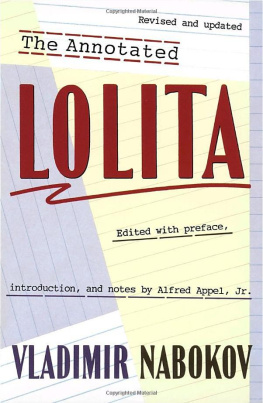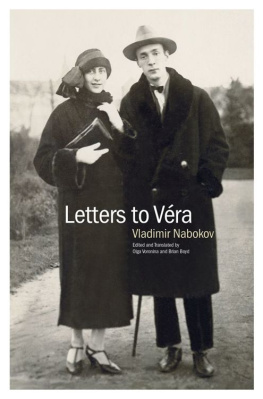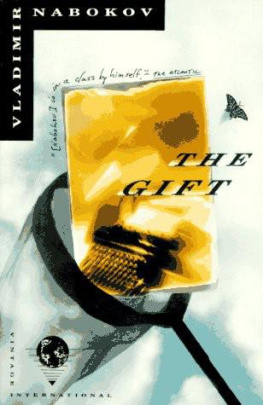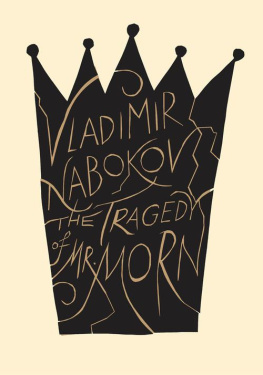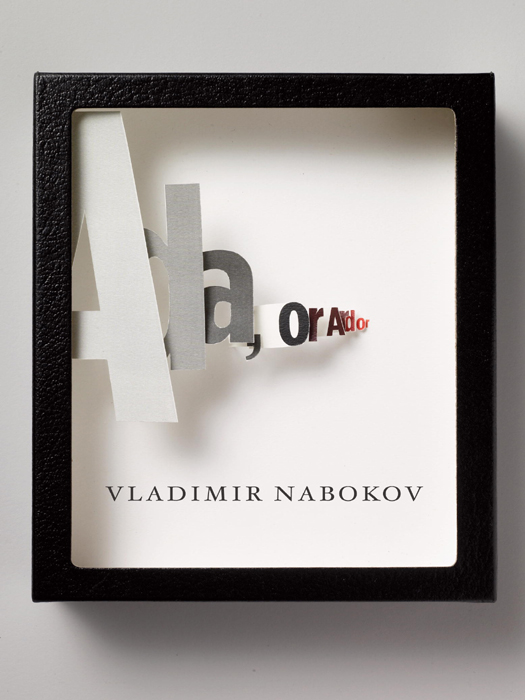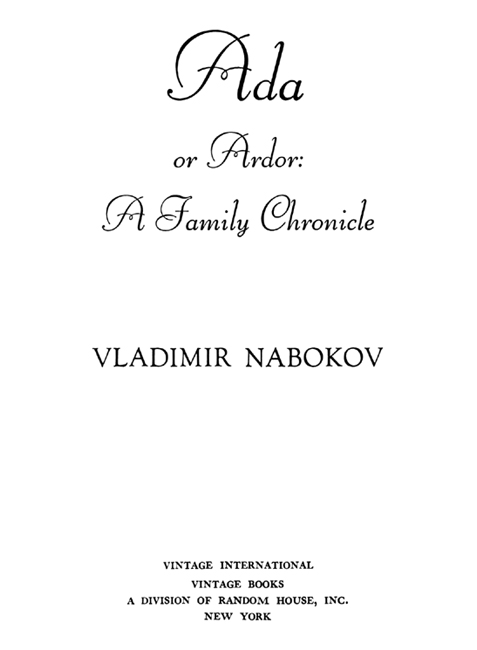BOOKS BY Vladimir Nabokov
NOVELS
Mary
King, Queen, Knave
The Defense
The Eye
Glory
Laughter in the Dark
Despair
Invitation to a Beheading
The Gift
The Real Life of Sebastian Knight
Bend Sinister
Lolita
Pnin
Pale Fire
Ada or Ardor: A Family Chronicle
Transparent Things
Look at the Harlequins!
SHORT FICTION
Nabokovs Dozen
A Russian Beauty and Other Stories
Tyrants Destroyed and Other Stories
Details of a Sunset and Other Stories
The Enchanter
DRAMA
The Waltz Invention
Lolita: A Screenplay
The Man from the USSR and Other Plays
AUTOBIOGRAPHY AND INTERVIEWS
Speak, Memory: An Autobiography Revisited
Strong Opinions
BIOGRAPHY AND CRITICISM
Nikolai Gogol
Lectures on Literature
Lectures on Russian Literature
Lectures on Don Quixote
TRANSLATIONS
Three Russian Poets: Translations of Pushkin,
Lermontov, and Tiutchev
A Hero of Our Time (Mikhail Lermontov)
The Song of Igors Campaign (Anon.)
Eugene Onegin (Alexander Pushkin)
LETTERS
Dear Bunny, Dear Volodya:
The Nabokov-Wilson Letters, 19401971
Vladimir Nabokov: Selected Letters, 19401977
MISCELLANEOUS
Poems and Problems
The Annotated Lolita

F IRST V INTAGE I NTERNATIONAL E DITION , F EBRUARY 1990
Copyright 1969 by Article 3 C Trust
under the will of Vladimir Nabokov
Notes copyright 1970
by Vladimir Nabokov
All rights reserved under International and Pan-American Copyright Conventions. Published in the United States by Vintage Books, a division of Random House, Inc., New York. Originally published by McGraw Hill Book Company, New York, in 1969. This edition published by arrangement with the Estate of Vladimir Nabokov.
Library of Congress Cataloging-in-Publication Data
Nabokov, Vladimir, 18991977.
Ada, or, Ardor, a family chronicle/Vladimir Nabokov.1st Vintage international ed.
p. cm.(Vintage international)
Originally published by McGraw Hill Book Company in 1969T.p. verso.
eISBN: 978-0-307-78801-6
I. Title. II. Title: Ada. III. Title: Ardor, a family Chronicle.
PS3527.A15A65 1990
813.54dc20
89-40107
CIP
Cover art by Chip Kidd
Cover photograph by Alison Gootee
v3.1
To Vra
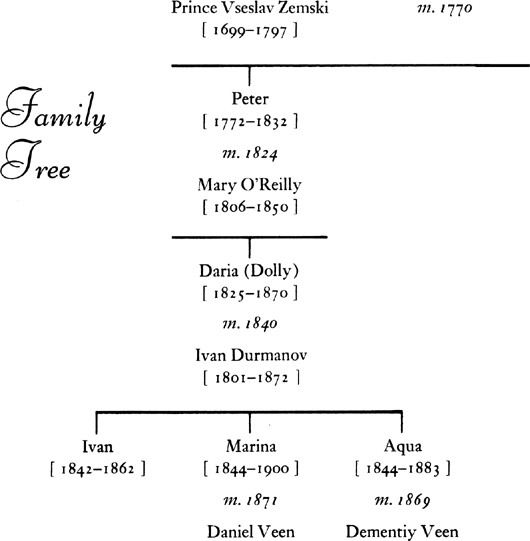
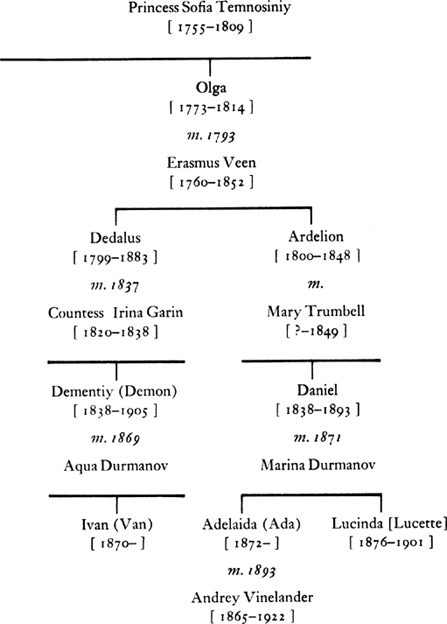
With the exception of Mr. and Mrs. Ronald Oranger,
a few incidental figures,
and some non-American citizens, all the persons
mentioned by name in this book are dead.
[Ed.]
Contents
Part One
1
All happy families are more or less dissimilar; all unhappy ones are more or less alike, says a great Russian writer in the beginning of a famous novel (Anna Arkadievitch Karenina, transfigured into English by R. G. Stonelower, Mount Tabor Ltd., 1880). That pronouncement has little if any relation to the story to be unfolded now, a family chronicle, the first part of which is, perhaps, closer to another Tolstoy work, Detstvo i Otrochestvo (Childhood and Fatherland, Pontius Press, 1858).
Vans maternal grandmother Daria (Dolly) Durmanov was the daughter of Prince Peter Zemski, Governor of Bras dOr, an American province in the Northeast of our great and variegated country, who had married, in 1824, Mary OReilly, an Irish woman of fashion. Dolly, an only child, born in Bras, married in 1840, at the tender and wayward age of fifteen, General Ivan Durmanov, Commander of Yukon Fortress and peaceful country gentleman, with lands in the Severn Tories (granoblastically and organically, with Russian Canady, otherwise French Estoty, where not only French, but Macedonian and Bavarian settlers enjoy a halcyon climate under our Stars and Stripes.
sur-royally antlered general with a controlled belly laugh, followed by a small closing cough of feigned detachmenthe dreaded his wifes flares).
On April 23, 1869, in drizzly and warm, gauzy and green Kaluga, Aqua, aged twenty-five and afflicted with her usual vernal migraine, married Walter D. Veen, a Manhattan banker of ancient Anglo-Irish ancestry who had long conducted, and was soon to resume intermittently, a passionate affair with Marina. The latter, some time in 1871, married her first lovers first cousin, also Walter D. Veen, a quite as opulent, but much duller, chap.
The D in the name of Aquas husband stood for Demon (a form of Demian or Dementius), and thus was he called by his kin. In society he was generally known as Raven Veen or simply Dark Walter to distinguish him from Marinas husband, Durak Walter or simply Red Veen. Demons twofold hobby was collecting old masters and young mistresses. He also liked middle-aged puns.
Daniel Veens mother was a Trumbell, and he was prone to explain at great lengthunless sidetracked by a bore-baiterhow in the course of American history an English bull had become a New England bell. Somehow or other he had gone into business in his twenties and had rather rankly grown into a Manhattan art dealer. He did not haveinitially Lake Kitezh, near Luga, comprising, and practically consisting of, that large, oddly rectangular though quite natural body of water which a perch he had once clocked took half an hour to cross diagonally and which he owned jointly with his cousin, a great fisherman in his youth.
Poor Dans erotic life was neither complicated nor beautiful, but somehow or other (he soon forgot the exact circumstances as one forgets the measurements and price of a fondly made topcoat worn on and off for at least a couple of seasons) he fell comfortably in love with Marina, whose family he had known when they still had their Raduga place (later sold to counter-Fogg direction on a triple trip round the globe, adopting, like an animated parallel, the same itinerary every time. In November 1871, as he was in the act of making his evening plans with the same smelly but nice cicerone in a caf-au-lait suit whom he had hired already twice at the same Genoese hotel, an aerocable from Marina (forwarded with a whole weeks delay via his Manhattan office which had filed it away through a new girls oversight in a dove hole marked RE AMOR) arrived on a silver salver telling him she would marry him upon his return to America.
According to the Sunday supplement of a newspaper that Goodnight Kids, Nicky and Pimpernella (sweet siblings who shared a narrow bed), and that had survived with other old papers in the cockloft of Ardis Hall, the Veen-Durmanov wedding took place on St. Adelaidas Day, 1871. Twelve years and some eight months later, two naked children, one dark-haired and tanned, the other dark-haired and milk-white, bending in a shaft of hot sunlight that slanted through the dormer window under which the dusty cartons stood, happened to collate that date (December 16, 1871) with another (August 16, same year) anachronistically scrawled in Marinas hand across the corner of a professional photograph (in a raspberry-plush frame on her husbands kneehole library table) identical in every detailincluding the commonplace sweep of a brides ectoplasmic veil, partly blown by a parvis breeze athwart the grooms trousersto the newspaper reproduction. A girl was born on July 21, 1872, at Ardis, her putative fathers seat in Ladore County, and for some obscure mnemonic reason was registered as Adelaida. Another daughter, this time Dans very own, followed on January 3, 1876.



